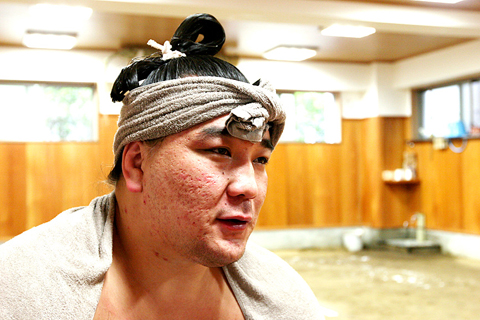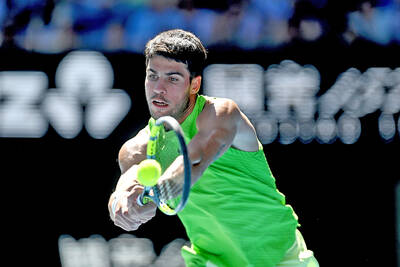The Japanese word kawaigari means “doting,” but in the grueling world of sumo it is an ironic euphemism for pushing a wrestler to the very limits of his physical and mental endurance.
It can include beatings with bamboo sticks and choking with sand or salt — and in one infamous case led to the death of a teenage recruit who had tried to flee the privations of his sumo stable.
Harumafuji, who last month won Japan’s major tournament, recalled the pain and tears that toughened him up in the nine years since he arrived from his native Mongolia with no money and not a word of Japanese.

PHOTO: AFP
“It’s a man’s world,” said the 25-year-old champion whose real name is Davaanyam Byambadorj, taking a rest with a sweatband around his head after a recent five-hour morning training session in his Tokyo stable.
“I had to get used to the bullying, beatings, hunger, and then the language and the culture which I did not understand,” he said, recalling how he was singled out for extra torment because he is a foreigner.
“It was rough,” he said. “It’s a world where you either become strong or not. In that sense, as much as it was painful, I felt very strongly that I would do my best to become strong as quickly as possible.”
In sumo, kawaigari means “crying, then being forced to stand, then being beaten again. It’s not simple to express with words because it’s a physical experience,” he said.
But it’s not just the beatings that steel the wrestlers in the quasi-monastic life of the sumo stable, where the fighters forfeit much of their personal liberty and embark on a grueling daily routine.
The younger wrestlers start the day at 3am cleaning the stable, washing their seniors’ loincloths and preparing meals. They are banned from watching television and using cellphones, and receive only modest pocket money.
Harumafuji said he found it toughest to get used to a diet heavy on fish — which has sent some of his mutton-eating compatriots running to the Mongolian embassy to escape Japan — served in huge quantities of 10,000 calories a day.
“Everyone says going on a diet is hard, but I think gaining weight is so many times more difficult,” he said. “Eating was the scariest, and my most painful experience.”
“I’m thin by nature, so I really had a hard time to eat in the beginning. I ate and I vomited. Ate and vomited. Your stomach expands when you do that, so I was forced to eat until I vomited,” Harumafuji said. “When I vomited, there would be someone already waiting with food, and I was forced to eat again.”
The force-feeding helped boost the 1.85m athlete’s weight to 126kg from 86kg — still about 30kg lighter than the average top division wrestler.
Harumafuji has no regrets.
“The sumo ring is very honest. He who really does his best will rise. Man’s efforts don’t lie,” he said. “I’m glad I did sumo, I am very grateful. I have learnt many things inside the ring, about life, the path I’ve chosen, about cherishing people.”
“Any punk who swaggers into a stable will change in one day. He will be cleaning the next day — cleaning toilets, crying. He’d be forced to lick the toilet bowl, because he’d be bullied,” Harumafuji said, smirking. “There are many obstacles, but if you’re able to get over them, you can become stronger than the others. If you rise up, everyone will follow you, thinking, ‘This guy’s tough.’”
Sumo may be as Japanese as samurai and sushi, but foreign-born wrestlers have entered the ring to steal the show in the 2,000-year-old national sport.
Sumo hasn’t had a home-grown champion in more than three years, and in the latest national tournament more than one-third of competitors were foreigners.
As fewer young Japanese sign up for the harsh life of the sumo stable, the sport’s 700-strong elite now include men from China, South Korea, Eastern Europe and as far away as Brazil and the Pacific island state of Tonga.
As sports such as baseball and soccer have gained ground, the number of Japanese sumo recruits has more than halved since its peak in 1992 of 223 local wrestlers.
Traditionally, young wrestlers were recruited from farming and fishing communities in the remote north and south, said Doreen Simmons, a veteran English-language sumo commentator for national broadcaster NHK.
Sumo opened its doors to foreigners decades ago, and spectators still delight when gaijin wrestlers exhibit what are seen by many as the essential Japanese characteristics of modesty, endurance and diligence.
The presence of foreigners will not lead to the internationalization of the sport, Simmons said, as the newcomers must assimilate, learn Japanese and adapt to the local diet, dress, customs and training regime.
“Any foreigner who succeeds in sumo must do it the Japanese way,” she said.

The Philadelphia 76ers, fueled by 36 points from Tyrese Maxey and a triple-double from Joel Embiid, on Thursday beat the Houston Rockets 128-122 in an NBA overtime thriller. Cameroonian big man Embiid scored 32 points, grabbed 15 rebounds and handed out 10 assists, posting the ninth triple-double of his career to help the Sixers end the Rockets’ three-game winning streak. Rockets star Kevin Durant scored 36 points and Amen Thompson added 17, but Thompson was scoreless in the fourth quarter. Even so, the Rockets led by nine midway through the final frame, Maxey tying it at 115-115 with 40.1 seconds left. Durant missed a

The Milwaukee Bucks’ Giannis Antetokounmpo on Friday said that he will probably be out for an extended period after hurting his right calf again after a similar injury caused him to miss eight games earlier this season. Antetokounmpo had his right calf wrapped in the first half of their 102-100 loss to the Denver Nuggets. He did not appear comfortable the rest of the night and left for good with 34 seconds remaining. “At the end, I could not move no more, so I had to stop playing,” Antetokounmpo said. The two-time NBA Most Valuable Player said he expected to undergo an MRI

Luka Doncic on Monday produced a 46-point masterpiece as the Los Angeles Lakers snapped the Chicago Bulls’ four-game winning streak with a 129-118 victory on the road. Doncic rattled in eight three-pointers on 15-of-25 shooting from the field, finishing with seven rebounds and 11 assists to lead an impressive Lakers effort at the United Center. LeBron James chipped in with 24 points, five rebounds and three assists, while Rui Hachimura delivered an eye-catching cameo off the bench with 23 points from nine-of-11 shooting. The win was another encouraging result for the Lakers after a 116-110 defeat of the Dallas Mavericks on Saturday. “We did

Taiwanese FORTUNES: Wu Fang-hsien and Hsieh Su-wei both advanced to the last 16 of the women’s doubles, but Ray Ho was ousted in the men’s doubles Carlos Alcaraz yesterday stepped up his quest to win a maiden Australian Open as he overwhelmed showman Corentin Moutet to reach the last 16, while Taiwan’s Wu Fang-hsien and Hsieh Su-wei both advanced to the last 16 of the women’s doubles. Three-time finalist Daniil Medvedev battled through on day six at a warm and sunny Melbourne Park, as did Coco Gauff. Top seed Alcaraz was never in danger against French 32nd seed Moutet, easing through 6-2, 6-4, 6-1 at Rod Laver Arena in 2 hours, 5 minutes. It was the Spaniard’s 100th Grand Slam match and he boasts a remarkable 87-13 win-loss record,